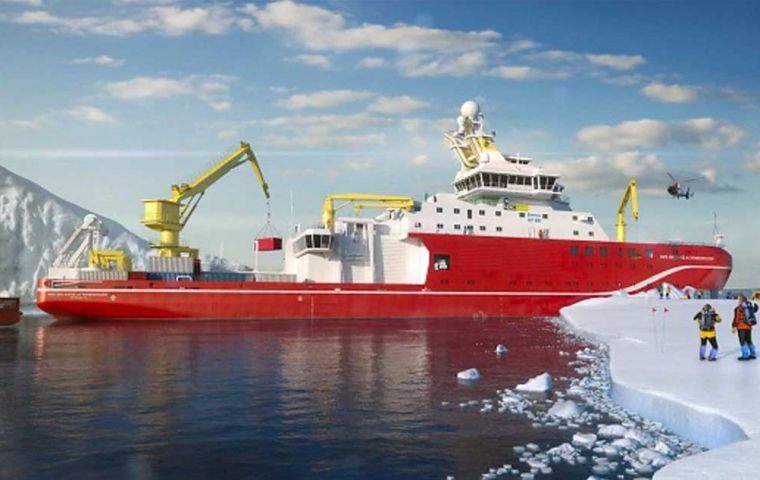MercoPress. South Atlantic News Agency
UK investing heavily in Antarctica and Arctic research to remain world leader in polar science
 The Modernization program (AIMP) has so far delivered a new polar research ship, RRS Sir David Attenborough
The Modernization program (AIMP) has so far delivered a new polar research ship, RRS Sir David Attenborough The UK is investing in modernizing its Antarctica and Arctic research facilities, with total funding of £670 million, including £290 million announced this week. As a world leader in polar science, UK research conducted in the region is of global importance. This is in addition to existing science funding activities.
Investing in this research is crucial in helping us to understand the drivers and rates of the changes to polar ice, ocean and atmosphere, and the regional and global impacts of climate change.
This investment is transforming how British Antarctic Survey (BAS) facilitates and supports frontier science in the polar regions. The latest £290 million funding will provide up-to-date aircraft facilities to ensure cargo, scientists, and support staff can be transported easily to Antarctic research stations.
The projects are commissioned by the Natural Environment Research Council (NERC) part of UK Research and Innovation (UKRI), and funded by the Department for Business, Energy, and Industrial Strategy (BEIS).
The Antarctic Infrastructure Modernization program (AIMP) has so far delivered: a new polar research ship, RRS Sir David Attenborough; the upgrade of the wharf at Rothera Research Station, and King Edward Point and Bird Island in South Georgia, and modernization of the Signy research station.
BAS is building a new science support facility at Rothera Research Station to be used as a support facility for researchers along with new modern collaboration spaces. This is alongside upgraded aircraft facilities for links with South America. This will secure next generation polar science over the next 25 years.
Research undertaken on these continents answers globally significant questions, improving our understanding of our planet, climate change and polar science.
Over the coming decades, UK polar scientists will address some of the most important questions facing our changing planet, particularly the impact of melting ice sheets on global sea level.
The modernization program will enable collaboration with international partners, influencing the global climate change debate as we build on the UK’s environmental leadership beyond COP26.
Professor Sir Duncan Wingham, Executive Chair of NERC, part of UKRI, said: “This new investment is part of a wider, long-term programme of renewal of the UK’s polar infrastructure that includes the new polar vessel, the RRS Sir David Attenborough, and the replacement of the UK’s Rothera buildings with modern, low-energy accommodation and laboratories.
”It will future proof the air bridge with South America and the Falkland Islands. The renewal program recognizes the central role of the Antarctic in future climate change and the commitment of the UK to maintain its leadership of polar science“.
Professor Dame Jane Francis, Director of BAS, said: ”Investing in Antarctic infrastructure means we can secure the future for the next generation of polar scientists. It means BAS can continue to be a world leader for polar science, addressing issues of global importance and helping society adapt to a changing world.
“The British Antarctic Survey has provided a permanent British scientific presence in Antarctica for the past 60 years, undertaking a vast range of science, which includes discovery of the ozone hole and an ongoing major project to study the stability of the West Antarctic Ice Sheet”.




Top Comments
Disclaimer & comment rulesCommenting for this story is now closed.
If you have a Facebook account, become a fan and comment on our Facebook Page!